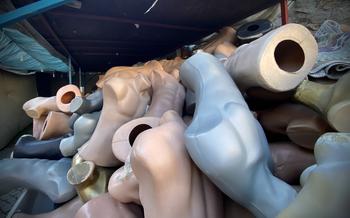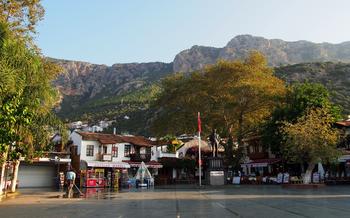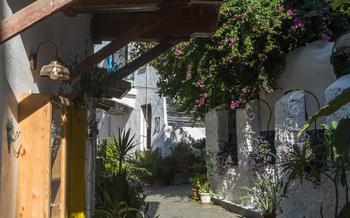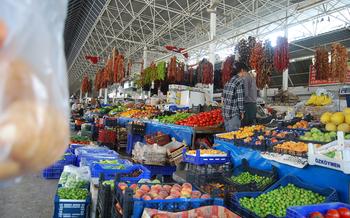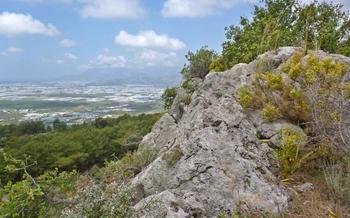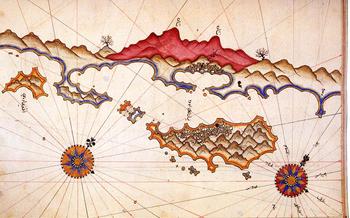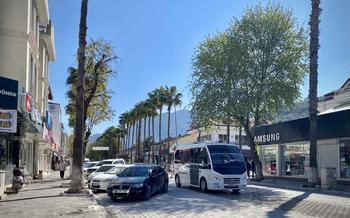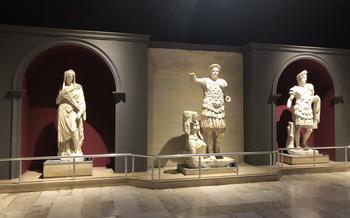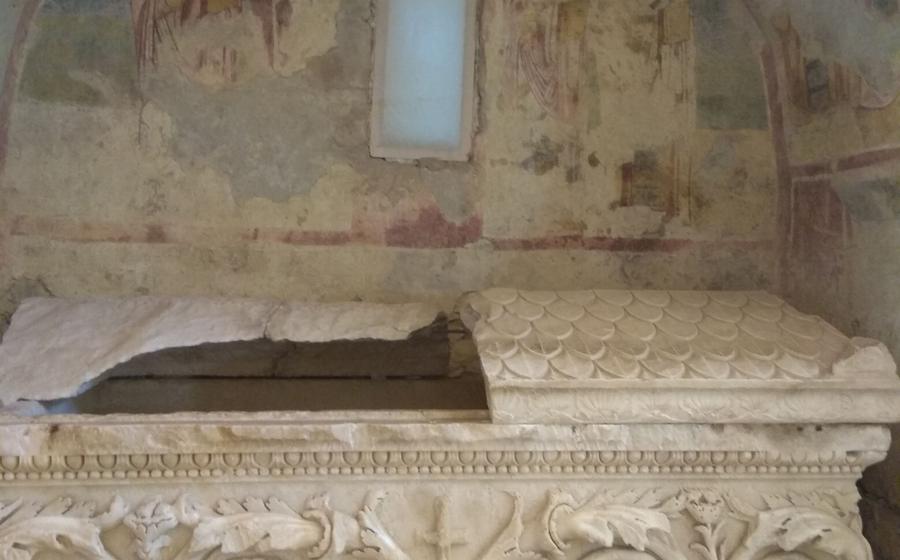
St. Nicholas Church in Demre
- The Church of St. Nicholas: A Timeless Legacy
- St. Nicholas: The Patron Saint of Sailors
- Demre: The Ancient City of Myra
- Exploring the Church's Interior
- The Archaeological Museum of Demre: Unveiling Ancient Treasures
- St. Nicholas Festival: Honoring the Patron Saint
- Taking a Guided Tour: Unveiling the History
- Planning Your Visit: Essential Tips
- Demre's Enchanting Harbor: A Scenic Stroll
- The Lycian Rock Tombs: A Historic Marvel
- Location and significance of the tombs
- Unique architectural style and carvings
- Ancient burial practices and customs
- Exploring the surrounding landscape
- Local Cuisine: Savoring Turkish Delights
- Shopping in Demre: Unique Souvenirs
- The Sunken City of Kekova: An Underwater Adventure
- Mount Olympos National Park: Hiking and Exploration
- Insider Tip: Unveiling Hidden Gems and Local Secrets
The Church of St. Nicholas: A Timeless Legacy
A journey to Demre, a serene coastal town in Turkey's Antalya region, unveils a hidden gem of immense historical and religious significance—the Church of St. Nicholas. This sacred edifice stands as a testament to the life and legacy of St. Nicholas, the revered patron saint of sailors and children. Built in the 6th century AD, the church draws pilgrims and history enthusiasts alike, eager to explore its architectural splendor and immerse themselves in the timeless stories associated with this beloved figure.
Beyond its religious importance, the Church of St. Nicholas boasts remarkable architectural features that showcase the Byzantine style prevalent during its construction. Intricate mosaics and frescoes adorn the interior, narrating biblical scenes and the life of St. Nicholas. These artistic masterpieces provide a glimpse into the beliefs and traditions of the early Christian community that flourished in this region.
The church's location in Demre, the ancient city of Myra, further enhances its significance. Myra, once a prominent Lycian city, played a vital role in the spread of Christianity in the Mediterranean. Today, visitors can explore the ruins of Myra, including an ancient theater, impressive rock tombs, and remnants of its prosperous past, all within close proximity to the Church of St. Nicholas.
Whether you're a history buff, a religious pilgrim, or simply seeking a glimpse into the life of a beloved saint, the Church of St. Nicholas in Demre offers a unique and enriching experience. Its timeless legacy continues to inspire and captivate visitors, leaving an indelible mark on their journey through this enchanting Turkish town.
St. Nicholas: The Patron Saint of Sailors
St. Nicholas, also known as Nicholas of Myra, is a widely revered figure in Christianity, particularly among seafarers and travelers. His life and legend are shrouded in mystery and folklore, but his reputation as a compassionate protector and miracle worker has endured for centuries.
Born in the 3rd century AD in Patara, Lycia (present-day Turkey), St. Nicholas is believed to have been a wealthy merchant who dedicated his life to helping those in need. According to legend, he secretly provided dowries for three impoverished sisters to prevent them from being sold into slavery. He is also said to have saved sailors from drowning during a fierce storm, earning him the title of patron saint of sailors.
In art, St. Nicholas is often depicted as a benevolent old man with a long white beard, wearing a red or gold robe and carrying a bishop's staff. He is also frequently shown with children, as he is known for his generosity and love for the young.
St. Nicholas' patronage of seafarers is particularly significant in coastal regions and among maritime communities. Sailors and fishermen pray to him for protection during their voyages, and many churches and chapels dedicated to him can be found along coastlines worldwide.
His miraculous deeds and stories have been passed down through generations, inspiring countless works of art, literature, and music. The most famous of these tales is the legend of St. Nicholas saving the three sisters, which is believed to be the origin of the modern-day tradition of gift-giving on St. Nicholas Day, celebrated on December 6th in many European countries.
Demre: The Ancient City of Myra
The history of Demre is intertwined with the ancient city of Myra, which was founded by the Lycians in the 5th century BC. Myra flourished as a major port city and religious center, becoming one of the most important cities in Lycia. The Lycians, known for their seafaring skills and advanced culture, left a lasting legacy in the region. Their influence can be seen in the impressive rock tombs, intricate sarcophagi, and other archaeological remains scattered throughout Demre.
The city's strategic location on the Mediterranean coast made it a hub for trade and commerce. Myra's wealth and prominence attracted various civilizations, including the Greeks, Romans, and Byzantines, who all left their mark on the city's architecture, culture, and religious traditions. Today, Demre proudly preserves its rich heritage, showcasing the remnants of ancient civilizations that once thrived within its boundaries.
As you explore Demre, you can't help but be captivated by its historical charm. The ruins of Myra, including the ancient theater, agora, and impressive Lycian tombs, offer a glimpse into the city's glorious past. These archaeological treasures provide a tangible connection to the Lycian civilization and the vibrant history that shaped this remarkable region.
Exploring the Church's Interior
Step inside the Church of St. Nicholas and be transported back in time. The Byzantine architecture, with its graceful arches and intricate stonework, sets the stage for a journey into the past. The walls are adorned with vibrant murals and mosaics that depict scenes from the Bible, telling stories of faith, hope, and redemption.
The iconography is rich and symbolic, inviting visitors to contemplate the deeper meanings embedded in each image. The chapel dedicated to St. Nicholas holds a special place within the church, adorned with exquisite artwork and artifacts that celebrate the life and legacy of this beloved saint.
The Archaeological Museum of Demre: Unveiling Ancient Treasures
The Archaeological Museum of Demre, located in the heart of the ancient city of Myra, houses a remarkable collection of artifacts and relics that shed light on the rich history and diverse cultures that have shaped this region. Step inside to embark on a journey through time, where you'll encounter Lycian sarcophagi intricately carved with scenes from mythology and daily life. These elaborate stone coffins, dating back to the 4th century BC, offer a glimpse into the burial practices and artistic traditions of the ancient Lycians.
The museum also boasts an impressive array of Hellenistic and Roman sculptures, each telling a story of the region's rich cultural heritage. Admire the finely crafted marble statues of gods, goddesses, and mythological creatures, as well as beautifully preserved busts of prominent figures from antiquity. These works of art provide a tangible connection to the past, allowing visitors to envision the vibrant world that once existed in Myra.
Intricate mosaics and inscriptions, unearthed from the ruins of Myra and its surrounding area, further enhance the museum's collection. These colorful mosaics depict scenes from Greek mythology, daily life, and religious practices, offering a glimpse into the artistic and cultural influences that shaped the ancient city.
The Archaeological Museum of Demre serves as a repository of knowledge and cultural heritage, preserving the legacy of the ancient Lycians, Greeks, and Romans who called this region home. Through its collection of artifacts, the museum invites visitors to explore the rich tapestry of history that defines Demre and its surroundings.
St. Nicholas Festival: Honoring the Patron Saint
Every year, on December 6th, Demre comes alive with the St. Nicholas Festival, a joyous celebration honoring the city's patron saint. This festival is a testament to the enduring legacy of St. Nicholas and his profound impact on the local community.
During the festival, the streets of Demre are adorned with colorful decorations, and the air is filled with the sounds of music, laughter, and merriment. Locals and visitors alike gather to participate in various festivities, including processions, religious ceremonies, and traditional performances.
A highlight of the festival is the grand procession that takes place through the city streets. Devotees carry an icon of St. Nicholas, accompanied by priests, choir members, and enthusiastic participants. The procession culminates at the St. Nicholas Church, where a special mass is held in honor of the saint.
The festival also provides an opportunity for cultural exchange and community spirit. Visitors can immerse themselves in local traditions and customs, such as traditional dances, folk music performances, and storytelling sessions. It's a time for the community to come together, celebrate their shared heritage, and honor the beloved figure of St. Nicholas.
Taking a Guided Tour: Unveiling the History
Joining a guided tour of the St. Nicholas Church in Demre is an enriching experience that enhances your understanding and appreciation of this historic site. Led by knowledgeable guides, these tours provide a deeper dive into the church's history, architecture, and religious significance.
Expert guides offer insights into the construction and design of the church, explaining the Byzantine architectural style and its unique features. They decipher the symbolism and iconography of the intricate murals and mosaics, bringing to life the biblical scenes and stories they depict.
Moreover, guides provide detailed information about the life and legend of St. Nicholas, the patron saint of sailors. They share miraculous deeds and stories associated with the saint, shedding light on his enduring legacy and significance for seafarers.
By joining a guided tour, you gain a personalized and comprehensive experience of the St. Nicholas Church. Guides adapt their explanations to the interests and questions of the group, ensuring a tailored and interactive visit. Their local knowledge and expertise offer a deeper connection to the history and culture of this sacred site.
Planning Your Visit: Essential Tips
When planning your visit to the St. Nicholas Church in Demre, it's essential to consider a few practical tips to ensure a smooth and enriching experience. The best time to visit is during the spring or fall when the weather is pleasant and crowds are smaller. Respecting local customs and traditions is crucial, so dress modestly and cover your shoulders and knees when visiting the church.
To fully appreciate the church's rich history and significance, consider joining a guided tour. These tours often provide insights into the church's architecture, religious symbolism, and the life of St. Nicholas. They can also offer a personalized experience and local knowledge that enhances your understanding of the site.
Essential facilities and amenities are available for tourists, including restrooms, a café, and a souvenir shop. It's worth noting that photography is allowed inside the church, but using flash is prohibited to protect the delicate frescoes and mosaics. By following these simple tips, you can ensure a memorable and fulfilling visit to the St. Nicholas Church in Demre.
Demre's Enchanting Harbor: A Scenic Stroll
Demre's picturesque harbor beckons travelers with its serene ambiance and breathtaking views of the Mediterranean Sea. Stroll along the charming promenade, where traditional fishing boats gently bob on the crystal-clear waters, creating a picture-perfect scene. The harbor exudes a timeless charm, inviting visitors to unwind and soak in the tranquil atmosphere.
Admire the vibrant colors of the boats, each adorned with intricate details and fishing nets, a testament to the town's rich maritime heritage. Take a leisurely walk along the waterfront, marveling at the stunning vistas of the Mediterranean Sea stretching out to the horizon.
Indulge in the local cuisine at one of the harbor's charming cafes or restaurants. Savor the freshest seafood delicacies, prepared with traditional Turkish flavors and spices, while enjoying the mesmerizing views of the harbor.
As the sun begins to set, the sky transforms into a canvas of vibrant hues, casting a warm glow over the harbor. Embrace the serenity of the evening as the gentle sound of lapping waves creates a soothing symphony. Demre's harbor is a true haven for those seeking tranquility and a glimpse into the town's rich maritime history.
The Lycian Rock Tombs: A Historic Marvel
Location and significance of the tombs
In the heart of Demre, nestled amidst olive groves and rolling hills, lies a remarkable testament to ancient Lycian civilization: the Lycian Rock Tombs. These impressive structures, carved into the sheer rock face, offer a glimpse into the rich history and funerary practices of this enigmatic people. The tombs date back to the 4th century BC, when Myra was a thriving city-state. They were meticulously crafted by expert stonemasons, who utilized the natural rock formations to create elaborate and ornate facades.
Unique architectural style and carvings
What sets these tombs apart is their unique architectural style and intricate carvings. Each tomb features a different design, showcasing the artistry and craftsmanship of the Lycians. The facades are adorned with intricate reliefs depicting scenes from mythology, daily life, and religious beliefs. These carvings provide valuable insights into the customs and traditions of the Lycian people, offering a glimpse into their cultural heritage.
Ancient burial practices and customs
The Lycian Rock Tombs were not merely burial chambers but also served as a testament to the afterlife. According to Lycian beliefs, the soul embarked on a journey after death, passing through various realms before reaching the underworld. The tombs were designed to facilitate this transition, providing a resting place for the deceased and a connection to the divine.
Exploring the surrounding landscape
The Lycian Rock Tombs are located in a picturesque setting, surrounded by lush vegetation and panoramic views of the surrounding countryside. Visitors can take a leisurely walk through the olive groves, admiring the tombs from different angles and exploring the surrounding landscape. The area is dotted with other ancient ruins, such as the remains of a theater and a temple, offering a glimpse into the grandeur of ancient Myra.
Local Cuisine: Savoring Turkish Delights
Demre's culinary scene offers a delightful blend of traditional Turkish flavors and fresh Mediterranean ingredients. Indulge in the aromatic dishes that have made Turkish cuisine renowned worldwide. Try the mouthwatering pide, a boat-shaped flatbread topped with various savory fillings. Savor the succulent grilled meats, including succulent kebabs and tender lamb chops, cooked to perfection over hot coals.
Seafood enthusiasts will delight in the fresh catches of the day, prepared with simple yet flavorful techniques. Sample the grilled octopus, a local delicacy, or savor the tender calamari cooked to perfection. Vegetarians and vegans will find plenty of options, such as stuffed grape leaves, flavorful mezes, and a variety of fresh salads bursting with local produce.
Don't miss the opportunity to try Turkish delight, a sweet and chewy confection made with sugar, starch, and flavored with rose water or other essences. Delight your taste buds with the rich and creamy künefe, a shredded filo pastry dessert filled with melted cheese and drizzled with sweet syrup.
To fully immerse yourself in the local culinary experience, visit the bustling market in Demre. Here, you can browse the colorful stalls selling fresh fruits, vegetables, spices, and herbs. Engage with the friendly vendors and learn about the local culinary traditions. Purchase ingredients to create your own Turkish feast or simply enjoy the vibrant atmosphere and the delicious aromas that fill the air.
Shopping in Demre: Unique Souvenirs
Demre offers a vibrant shopping scene, allowing visitors to take home unique souvenirs and local treasures. The Arasta Bazaar is a must-visit for those seeking authentic Turkish handicrafts and textiles. Here, you'll find an array of colorful carpets, intricate ceramics, and traditional clothing. Haggling is expected, so don't be afraid to bargain for the best price.
For those interested in handmade ceramics and pottery, Demre's pottery workshops offer a fascinating glimpse into the local craftsmanship. You can watch skilled artisans create beautiful pieces using traditional techniques and purchase unique souvenirs directly from the source.
The Demre Spice Market is a delight for the senses, offering a vibrant array of spices, herbs, and teas. From aromatic cumin and saffron to fragrant thyme and oregano, the market is a treasure trove of culinary delights. You can also find locally produced honey, olive oil, and jams, perfect for adding a taste of Demre to your home cooking.
When shopping in Demre, remember to respect local customs and traditions. Dress modestly and be mindful of your behavior in religious and cultural spaces. Embrace the opportunity to interact with friendly locals, learn about their way of life, and support the local economy by purchasing from small businesses and artisans.
The Sunken City of Kekova: An Underwater Adventure
Just a short boat trip from Demre lies the captivating sunken city of Kekova. Once a thriving port town, Kekova met its fate when a devastating earthquake in the 2nd century AD caused a portion of the city to sink beneath the waves. Today, the ruins of Kekova offer a unique opportunity to explore an ancient city from the depths of the Mediterranean Sea.
For adventurers and history enthusiasts, snorkeling or diving in Kekova is an unforgettable experience. Submerged buildings, streets, and artifacts can be seen beneath the crystal-clear waters, providing a glimpse into the city's past. The underwater ruins are teeming with marine life, creating a captivating blend of history and nature.
Kekova's sunken city is not only a fascinating archaeological site but also a haven for marine biodiversity. The waters surrounding the ruins are home to a variety of fish species, colorful coral reefs, and diverse marine flora. Snorkeling and diving enthusiasts can explore this underwater paradise, discovering the secrets of Kekova's past while immersing themselves in the beauty of the Mediterranean Sea.
Preserving the natural and historical heritage of Kekova is of paramount importance to ensure that future generations can continue to enjoy this unique underwater destination. Responsible tourism practices, such as respecting the marine environment, refraining from touching or removing artifacts, and following local regulations, are essential in protecting this fragile site for years to come.
Mount Olympos National Park: Hiking and Exploration
Nestled along the Mediterranean coast, Mount Olympos National Park beckons nature enthusiasts with its breathtaking landscapes, diverse ecosystems, and rich history. Embark on a hiking adventure through the park's picturesque trails, leading you to panoramic vistas, cascading waterfalls, and lush forests. Discover the park's hidden gems, including ancient ruins and historical sites that tell tales of past civilizations. As you explore the park's diverse flora and fauna, encounter endangered species and witness the vibrant tapestry of life that thrives within this natural sanctuary. Whether you're an experienced hiker or simply seeking a tranquil escape, Mount Olympos National Park offers an unforgettable experience for all.
Insider Tip: Unveiling Hidden Gems and Local Secrets
Venture beyond the popular tourist spots and uncover the hidden treasures of Demre. Seek out the Church of the Holy Apostles, a lesser-known yet equally significant Byzantine church located near the harbor. Its well-preserved mosaics and frescoes offer a glimpse into the town's rich history.
For a unique cultural experience, visit the Demre Market, a vibrant hub of local life. Immerse yourself in the sights, sounds, and scents as you browse through stalls selling fresh produce, traditional textiles, and handmade crafts. Engage with friendly locals and discover the authentic side of Demre.
Indulge in a culinary adventure at one of the family-run restaurants in the old town. Savor the flavors of traditional Turkish cuisine, prepared with fresh local ingredients and passed down through generations. Ask for recommendations from the locals to find hidden gems that offer a truly authentic dining experience.
Demre is a treasure trove of hidden gems waiting to be explored. Embrace the spirit of adventure, wander off the beaten path, and uncover the secrets that make this charming town so special. Create lasting memories and a deeper connection with Demre by delving into its lesser-known wonders.
